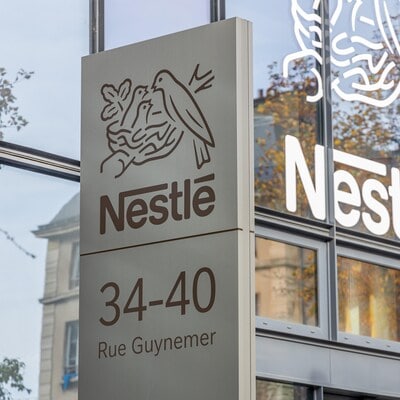)
The company cut its sales outlook in July but affirmed its expectation of a moderate increase in underlying profitability for this year. (Photo: Shutterstock)
By Dasha Afanasieva
The world’s biggest food company is getting back to basics — feeding a growing planet, but one whose consumers are both more savvy and financially stretched.
Nestle SA, the maker of DiGiorno pizzas and Purina pet food, has replaced Chief Executive Officer Mark Schneider with Laurent Freixe, shifting from an outsider who previously ran a health-care company to an insider who’s climbed the Swiss company’s executive ranks across several regions, focusing on core functions like marketing and selling.
The abrupt move has raised concerns about the extent of Nestle’s problems, after it’s missed sales expectations for multiple quarters, with investors fearing it might soon drop its profitability targets. It also signals that the company is likely to rein in its more experimental bets after Schneider pushed Nestle into new areas straddling nutrition and health.
Companies like Nestle are grappling with sluggish demand, as inflation-squeezed shoppers tighten their belts. Many are looking to save money while e-commerce has opened up competition, making it harder to build massive global brands. To secure investor returns, profitability becomes more important. But aggressive cost-cutting risks starving brands of investment.
Freixe and Chairman Paul Bulcke on Friday declined to confirm guidance for the mid term — when it had targeted underlying operating margin of at least 17.5% — or even for this year, deferring to an investor event scheduled for November.
Capital Markets Day
“We will come back in detail to these questions on the capital markets day,” Freixe said on a call with analysts and investors, adding that productivity was a priority.
The uncertainty of these targets and the shock of the announcement helps explain the downbeat market reaction: Nestle shares fell as much as 4.1% Friday, a sharp contrast to the enthusiastic reaction when Starbucks Corp. announced a new boss last week. Even though Schneider’s departure came as a surprise externally, poor morale appears to have been building within the company: “First thing is, rally the troops,” Bulcke said.
The company cut its sales outlook in July but affirmed its expectation of a moderate increase in underlying profitability for this year. When considering whether to slash margin guidance at the Nov. 19 event, Freixe will likely be looking to the experience of Unilever Plc’s former boss Alan Jope. The Scotsman regretted keeping his predecessor Paul Polman’s margin target when he became boss in 2019. That goal was widely blamed for the underinvestment in its brands and played a part in his eventual exit.
“In the long term, yes, you can be profitable and have high growth, but in the short term, to get to those promised lands, you need to invest,” Bernstein analyst Bruno Monteyne said, adding that tends to depress margins. “I find it surprising that so many CEOs always want to deny that. And it always comes back to haunt them.”
Nestle could borrow more of Unilever’s recent tactics. The Anglo-Dutch company’s restructuring under Jope’s successor, Hein Schumacher, has so far included shedding 7,500 jobs globally and a rollback of some of its environmental and social pledges, even though the Hellmann’s mayonnaise maker says there will be no cost benefit from the latter. So far Nestle has been coy on job cuts, preferring to quietly tweak market-by-market, rather than announcing large-scale programs.
Unilever is also spinning off or selling its ice cream business, something Nestle has already partially done through placing its Haagen-Dazs business in a joint venture with private equity fund PAI.
Health Bets
Freixe, who has been at Nestle for almost four decades, could also pivot away from more radical bets — particularly in health care, where Schneider has expertise due to his previous role running Germany’s Fresenius SE. His $2.6 billion bet on peanut allergy drug Palforzia was a flop, and an investment into a fecal transplant pill for gastrointestinal infections may not be a natural fit alongside a portfolio that also includes KitKat chocolate bars and Nescafe.
Looking for its next blockbuster category like pet food or coffee, Nestle spent $5.75 billion on supplements and vitamins in 2021. But a post-pandemic slowdown compounded by IT problems that hampered supply has undermined that investment.
“We would not be surprised if Nestle Health Science were to be sold in the medium term, which would be welcomed by the majority of investors,” ZKB analyst Patrik Schwendimann said.
Schneider has attempted to revitalize the unit through a focus on aging and on products that complement popular new weight-loss drugs from Novo Nordisk A/S and Eli Lilly & Co. Further trimming of the lower-margin bottled water business could also be on the cards.
Freixe said he will accelerate Nestle’s data transformation: AI and sophisticated data analysis is being used at big consumer goods makers to predict demand and drive down costs. Those savings can be reinvested into brand marketing to expand market share and sales of Nestle’s staples.
“While the food and beverage industry has gone through significant changes in recent years, our top priority, my top priority is to drive sustainable top-line growth through market-share gains,” Freixe said.
First Published: Aug 23 2024 | 11:16 PM IST
